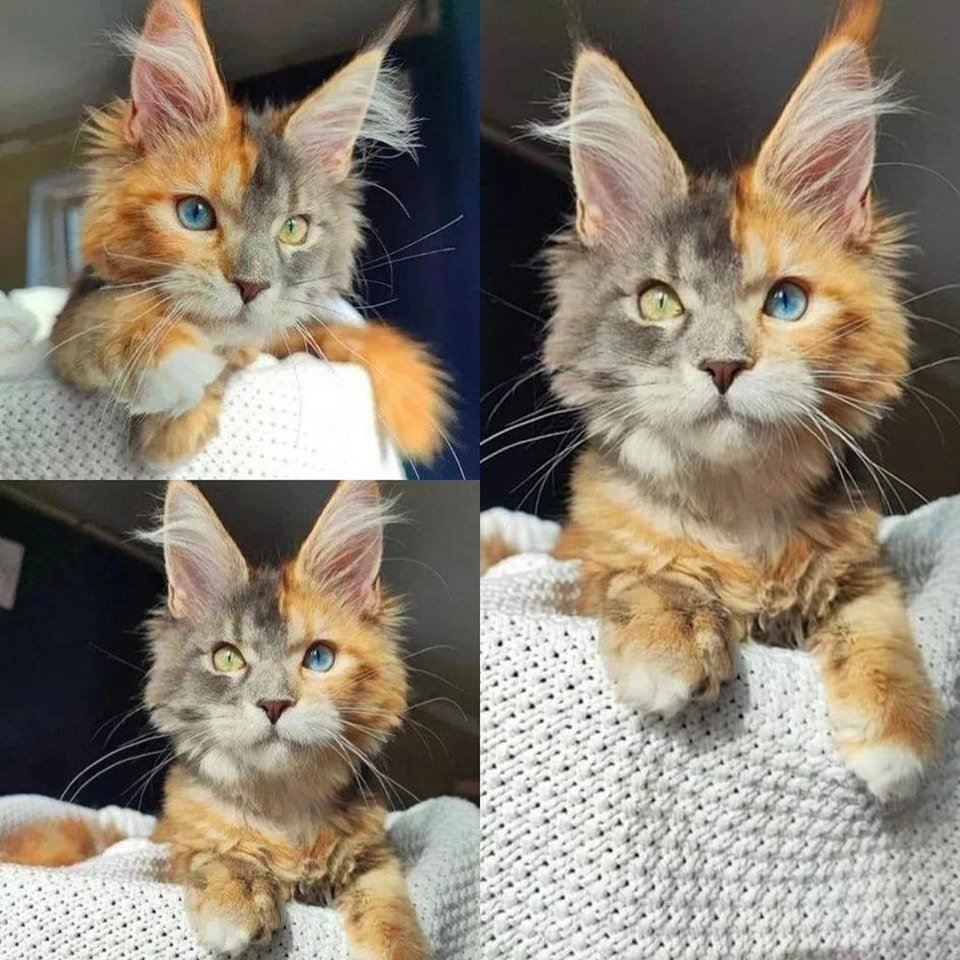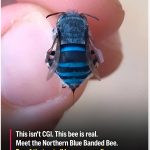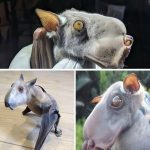The Cat Who Changed My Definition of Perfect

The Cat Who Changed My Definition of Perfect
I found her in a corner of the shelter, all curled up, as if trying to hide her face from the world. That day, the shelter was noisy—metal doors clinking, dogs barking, volunteers moving from cage to cage—but she was in complete stillness. Her body was pressed so tightly against the wall that it almost disappeared into the shadows, as though blending into the gray concrete might make her invisible to a world that had hurt her too many times before. She didn’t look at me at first. She didn’t look at anyone. Her tail was wrapped around her tiny frame like a shield. I knelt down slowly, trying to catch her eye, and my heart ached at the sight. There was something profoundly lonely in that little ball of fur, something that whispered of long days spent waiting without hope.

That little face, a bit crooked, a bit tilted—as if a smile had gotten stuck between two lives. One side of her mouth curved just slightly upward, like the trace of laughter that never fully arrived. It was the kind of face that might make someone pause for the wrong reasons—tilt their head, whisper words like “deformed” or “imperfect.” And yet, in that slight asymmetry, I saw poetry. I saw a story written in quiet resilience. Her eyes, mismatched in expression—one bright with curiosity, the other dulled by caution—were like windows opening into two worlds: the pain she had endured and the hope she still clung to. Most people, I knew, would glance at her and keep walking, chasing some glossy image of “perfection.” But perfection, I realized in that moment, had nothing to do with symmetry.
They told me she didn’t have much chance of being adopted. That “people want perfect cats.” The words were clinical, almost resigned, spoken by someone who had seen this too many times before. Animals with scars, with quirks, with faces that didn’t fit the picture-perfect mold—they waited the longest. Sometimes, they never left. As the volunteer spoke, I could hear the unspoken truth: “She will probably spend the rest of her life in this cage.” I looked back at her tiny frame, trembling with the weight of her solitude, and something inside me hardened—not out of pity, but out of defiance. Because what does “perfect” even mean? Who decided that beauty must be measured in straight lines and flawless features? To me, she was perfect the way wildflowers are perfect—unexpected, unrepeatable, blooming bravely in places no one thinks to look.
But she was perfect. To me, she was perfect from the very first moment. The kind of perfect that doesn’t shout for attention but waits quietly for the right heart to notice. I didn’t see what was missing or crooked or wrong. I saw life. I saw strength. I saw a creature who had endured whatever the world threw at her and was still here, still breathing, still capable of trust—even if that trust was buried deep under layers of hurt. And isn’t that its own kind of miracle? I think about how many people chase flawless things, only to find emptiness in their shine. Yet here was something raw and real, something that had been battered by life and had come out softer, not harder. That is a kind of perfection no symmetry can match.
I leaned toward her, and she looked me straight in the eyes. Not with pity, not with fear. With a soft kind of curiosity. It wasn’t an eager look. It didn’t beg. It didn’t plead. It was quiet, measured, as though she were saying: “Are you safe? Are you someone I can trust?” For a long heartbeat, we simply looked at each other—two souls measuring the space between them, wondering if we dared to cross it. In that silence, a question bloomed. Not just in her eyes, but in my heart: Am I capable of loving without condition? And then I realized, the answer had already been written in the way my hands ached to hold her, in the way my chest tightened at the thought of walking away.

As if she were wondering: Are you going to love me anyway? That question struck me like an arrow. It carried the weight of everything she had endured—every door that had closed, every hand that had failed her, every day she had spent curled in that corner believing she wasn’t enough. And in that question, I heard echoes of something bigger: the longing we all carry, deep down, to be chosen—not in spite of our flaws, but because of who we are, entirely and unapologetically.
No. Not anyway. Because of that. Thanks to that. Completely. Those words bloomed in my mind like a vow. I didn’t want to love her anyway, as though her differences were something to overlook. I wanted to love her because of them. Because they told a story. Because they made her who she was. Because they set her apart in a world obsessed with sameness. I reached out, slow and steady, and when my fingers brushed her fur, she didn’t flinch. She didn’t run. She just stayed there, breathing softly, as if testing the edges of this new possibility. And in that fragile moment, I felt something shift—not just for her, but for me.

I brought her home. The first few days, she stayed in a corner, quiet, observant. She watched me like a shadow, her eyes following every move with a mix of caution and curiosity. I let her take her time. Trust is a language spoken slowly, syllable by syllable, until one day you realize you’re fluent without even trying. And then, little by little, she began to move closer. First a step. Then a brush of fur against my leg. Then, one night, without warning, she climbed into my lap as if she had been doing it all her life.
And then one evening, without warning, she pressed her little asymmetrical face against my cheek. Just like in that photo. That single gesture held a world of meaning—a surrender, a thank you, a fragile thing called hope taking root and blooming at last. I closed my eyes and breathed her in, and I understood: she had chosen me, too.

Today, she still smiles a little sideways. And it’s the most beautiful smile I’ve ever seen. She runs, she plays, she climbs on everything like a queen reclaiming her kingdom. She has no idea that some people find her appearance strange. She doesn’t know what “imperfection” means. All she knows is that she is safe, and loved, and free to be exactly who she is. And every time I look at her, I am reminded of this truth: beauty was never about symmetry. It was always about authenticity.
This isn’t just her story. It’s a mirror held up to all of us. Because in some way, aren’t we all that little cat, sitting in a corner, wondering if someone will see us and love us not despite our flaws, but because of the story they tell? If you’ve ever felt “not enough,” take it from a crooked-faced cat who turned my world inside out: you are not too broken, too strange, or too different to be loved. Sometimes, what makes you different is what makes you unforgettable.

So, when you walk into a shelter—or into any corner of life—look for the ones the world has overlooked. The quiet fighters. The crooked smiles. The souls who have been told they aren’t perfect enough. Because when you choose them, you’re not just saving a life. You’re discovering a kind of beauty that will stay with you forever.










